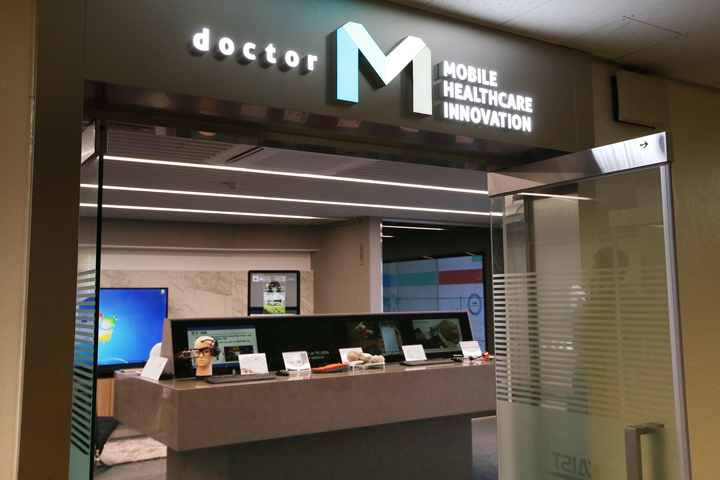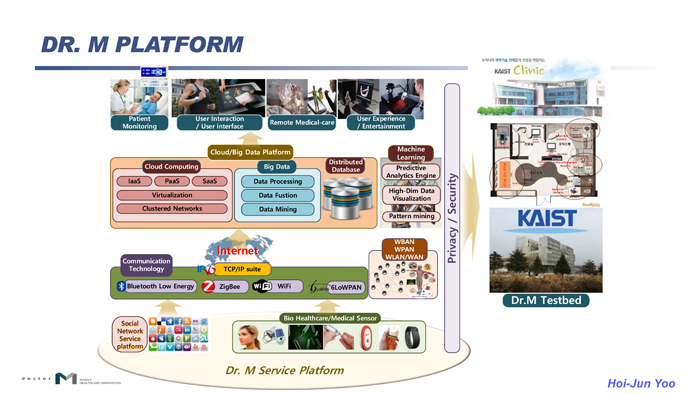event
< KAIST Opens a Mobile Healthcare Technology Showroom on Campus >
Portable and wearable computers have made the way we manage our health easier and potentially more effective. Researchers from six departments and one graduate school at KAIST collaborated and conducted a one-year project called the “Mobile Healthcare Innovation” to develop a mobile healthcare system. Their research results are on exhibit on campus at the “Dr. M Showroom” which was open on March 13, 2015.
Located on the second floor of the College of Information and Electrical Engineering building, the showroom displays the entirety of mobile healthcare system developed during 2014, from the collection of biological data through smart sensors to analyzing big data to provide customized healthcare models for patients.
Standing in for a mobile doctor, Dr. M is a networked medical service system provided through the Internet of Things (IoC), wearable electronics, smart home, and smart car. Under this care, people can monitor their health on a daily basis at any-time and place, helping them to lower the risk of serious health problems. Patients who have chronic diseases such as diabetes or cardiovascular illness can inform doctors of their health status in real time. Moreover, people living in remote regions can receive quality medical services without traveling long distances.
At the showroom, about 40 convergence technologies are displayed, including biological sensors, low-power communication devices, IoC technology, big data, disease analysis, and prediction technology, presenting how these technologies are connected and worked systematically. For example, all the data earned from biological sensors are analyzed to produce relevant user information. Once abnormalities are discovered, the results would be sent immediately to medical staff for treatment.
As part of Dr. M, KAIST has been implementing the establishment of a “Mobile Healthcare Campus,” distributing small, wearable wristbands to 100 students. The wristbands read students’ biological signals and send them to researchers for monitoring. In addition, KAIST plans to collaborate with local hospitals, nursing care centers, communications, and mobile healthcare service providers for the commercialization of Dr. M system.
Professor Hoi-Jun Yoo of the Electrical Engineering Department, who has led the Mobile Healthcare Innovation project said, “One of the great advantages Dr. M can offer is the capability to customize healthcare service based on individuals and ages. For individuals in their twenties, for example, healthcare services such as skincare and diet programs will be more relevant whereas blood pressure monitoring for patients in their fifties and early diagnosis for the recurrence of diseases for those in their seventies. If we define human history in terms of major technology advancements, the first big one was computation, communication for the second, and I think ubiquitous healthcare will be the third one. We will continue to develop Dr. M in collaboration with medical and research organizations.”
A total of 32 professors from the Departments of Electrical Engineering, Computer Science, Industrial and Systems Engineering, Industrial Design, Web Science, Knowledge Service Engineering, and the Information Security Graduate School participated in the Mobile Healthcare Innovation project.

< Total solution from sensors to healthcare service >

< Sensor system solution in Dr.M >

< Dr. M plaform >
-
event Research Day Highlights the Most Impactful Technologies of the Year
Technology Converting Full HD Image to 4-Times Higher UHD Via Deep Learning Cited as the Research of the Year The technology converting a full HD image into a four-times higher UHD image in real time via AI deep learning was recognized as the Research of the Year. Professor Munchurl Kim from the School of Electrical Engineering who developed the technology won the Research of the Year Grand Prize during the 2021 KAIST Research Day ceremony on May 25. Professor Kim was lauded for conducting cr
2021-05-31 -
policy KVIP Opened in Pangyo
KAIST has opened the KAIST Venture Innovation Program (KVIP) in its Center for Industry Outreach, designed for executive and high-ranking officers of venture companies. Located in Pangyo Techno Valley, KAIST’s Center for Industry Outreach was established in collaboration with the government of Gyeonggi Province to support venture companies in Pangyo for business management training, venture networking, and university-industry cooperation. The program will be held every Monday for 12 w
2015-03-23 -
research KAIST Presents the Largest Number of Research Papers at the 2015 ISSCC
KAIST will present the largest number of research papers at the 2015 IEEE International Solid-State Circuits Conference (ISSCC), a leading global forum held every year to share professional knowledge and advancements in solid-state circuits and systems-on-a-chip. The Institute of Electrical and Electronics Engineers (IEEE) Solid-State Circuits Society sponsors the conference. This year, the conference accepted 13 research papers from KAIST, ranking first among the participating organizations
2014-12-08